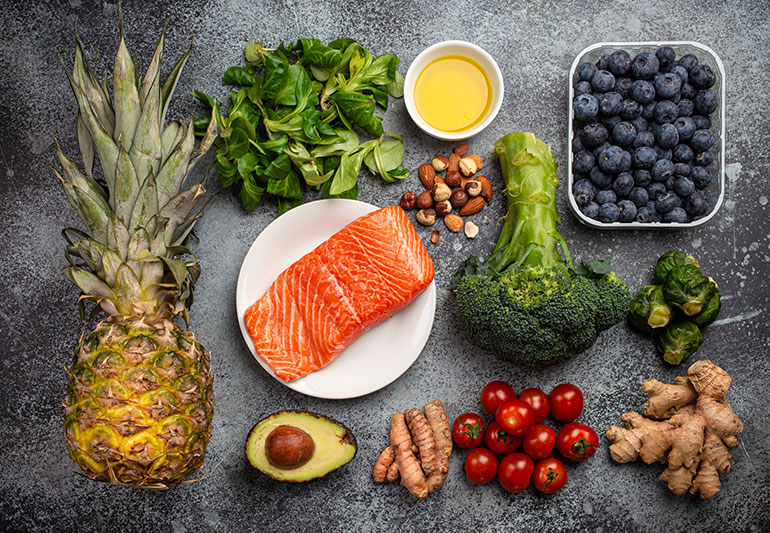Most metabolic diseases (including obesity) tend to inflame our bodies. This diet seeks to reduce or eliminate this inflammation. By adding some anti-inflammatory foods we can prevent ailments, improve our health and feel better.
Certain foods and habits influence our state of health. The diet helps prevent and combat problems or ailments such as inflammation. This occurs when our body defends itself from agents that could be harmful, such as injuries, infections or toxins, in order to heal itself.
When something damages our cells, we release chemicals, such as antibodies and proteins, in response to this damage. Inflammation can be acute (a bruise or swelling from an injury), lasting only a few days, or chronic, which occurs when our body’s defense response lasts and keeps us in a constant state of alert.
Chronic inflammation can be detrimental to your health and is linked to a variety of diseases, including cancer, diabetes, depression, arthritis, and Alzheimer’s. However, certain foods help reduce inflammation and also provide greater well-being.
Benefits of the anti-inflammatory diet
More than a diet as such, it is a lifestyle with a diet based on ingredients that prevent or reduce inflammatory processes. The anti-inflammatory diet is very useful to prevent these pathologies:
cardiovascular ailments. According to the Spanish Society of Cardiology, the Mediterranean diet prevents them. Avoid obesity and diabetes, which appear through inflammatory processes.
Joint problems. Arthritis , osteoarthritis and rheumatoid arthritis are inflammations of the joints that can be improved with proper nutrition.
Premenstrual syndrome. The increase in vitamins and omega 3 helps relieve symptoms such as headache , muscle pain and abdominal pain.
Early death. The Stockholm Institute of Medicine showed that an anti-inflammatory diet reduces the risk of death from cancer and lengthens life, even in smokers.
Alkaline and anti-inflammatory food
The alkaline diet maintains that diseases develop in an acid medium, that is, with a low pH (less than 7). To prevent them, we must increase the pH of our body through alkaline foods.
The alkaline diet encourages the consumption of vegetables, although it lacks a scientific basis, according to some nutritionists. These ensure that the pH of the body varies (the skin is usually between 4 and 6.5, while the pH of the stomach is between 1.35 and 3.5) and that we cannot change it.
Even so, those who defend this theory consider that the diet should include, at least, 80% alkaline foods and 20% acidifying or neutral. What is the difference between them?
- Alkaline foods. They help maintain a balanced pH to avoid imbalances in our body. Fruits, vegetables and seeds are part of this group.
- Acidifying foods. Meats in general, sugar, seafood and alcohol are foods with a pH below 7.
- Neutral or low alkalinity foods. Chickpeas, kidney beans, wholegrain rice and pasta, coconut oiland fruits such as grapes and bananas are moderately acidic foods, whose consumption should be 20% maximum.
weekly anti-inflammatory diet
The following seven foods can help prevent and reduce inflammation.
Green leafy vegetables . Chard, spinach, broccoli, cauliflower and Brussels sprouts have anti-inflammatory properties. Avocado, chili peppers and raw mushrooms too.
Berries . Strawberries, blueberries, and açai are a source of antioxidants that can reduce inflammation and boost immunity. Take them alone or add them to your smoothies.
Omega 3 . Oily fish (salmon, sardines), walnuts and almonds , and sesame and flax seeds are present. Add the latter to your breakfast or as a dressing in salads.
Turmeric . Contains curcumin, a natural colorant with proven anti-inflammatory benefits. You can add turmeric to creams, soups, rice dishes, stews and even batter flour.
ginger . It decreases the production of cytokines, proteins that favor chronic inflammation. In addition, it is very effective against stomach pain. Serve it with vegetables and fish.
Cherries and papaya . Anthocyanins and ellagic acid in cherries are antioxidants that protect cells. Papaya improves digestion and helps reduce inflammation in the abdomen .
green tea It is rich in flavonoids, which help calm inflammation in the body. Prepare an infusion of natural herbs daily and avoid taking it with sugar.
As you can see, food plays a key role in preventing or minimizing an inflammatory process. Combine it with sports practice to improve that ailment and the general state of your health.

